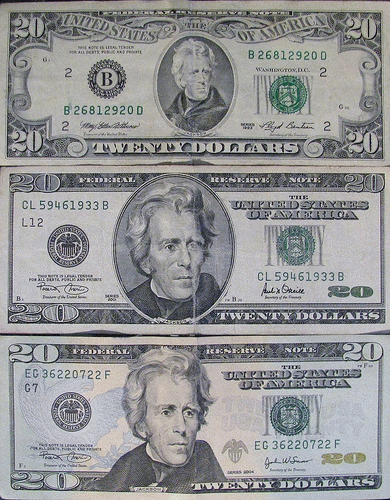Those who still doubt that an elite group of Marxists and Fascists control American policy need to look no further than the announcement by Treasury Secretary Jack Lew of his intention to remove Andrew Jackson from the face America's $20 dollar bill. President Jackson established the most fiscally sound administration in American history and adhered to founding American principles more closely than most U.S. Presidents. As General Jackson, his forces won the key battle that defeated the final massive British invasion and ended the war of 1812.
General Jackson's Accomplishments
Andrew Jackson was born in 1767 and served as a 13 year old courier in the Revolutionary War. When he refused to shine the shoes of a British officer after being captured, the officer slashed him with a sword leaving permanent scars on his head and arm. His two brothers and mother who was a nurse, all died during service in the Revolutionary War.
Jackson was appointed major general of the Tennessee militia in 1802. In the 1814 Battle of Horseshoe Bend, his forces defeated "Red Stick" Creek warriors who killed over 400 settlers in the Fort Mims massacre in Alabama. The warriors had been encouraged by Shawnee Chief Tecumseh who was aligned with British forces during the War of 1812. Jackson led U.S. Army regulars including Davy Crockett and Sam Houston as well as Choctaw and Cherokee warriors. The resulting Treaty of Fort Jackson confiscated millions of acres of Creek land but provided humanitarian assistance until the Creeks could sustain themselves again.
Jackson gained immense popularity for commanding Americans to an 1815 victory over the British in the Battle of New Orleans that ended the War of 1812. The British Army and Royal Navy attacked with huge forces for two weeks after British officials signed the Treaty of Ghent that should have ended hostilities. The British attempt to control the Mississippi River at New Orleans could have made a dramatic difference in the outcome of the war if successful.
Jackson's forces included state militias, U.S. Army regulars, Jean Lafiite's pirates as well as Chocktaw, Cherokee and friendly Creek warriors. They were outnumbered 2:1 but repelled the 11,000 man British invasion. The British lost 2,000 killed, wounded or captured soldiers while the Americans lost roughly 60 in one of the most lopsided and amazing victories in American history. "The Battle of New Orleans" was memorialized in song and an annual national holiday for the January 8 final day of battle was established. The holiday was recognized until 1861 immediately after Americans in 11 states, including Louisiana voted to secede from the Union.
President Jackson's Accomplishments
Andrew Jackson is the only president in American history whose administration paid off the national debt. His administration was also the last administration in American history that operated with a true balanced budget. He also bravely prevented wealthy banking family cartels from gaining monopolistic control of the American money supply when he vetoed Second National Bank legislation in 1832. His unequalled legendary accomplishments make him the most fiscally sound president in American history.
In 1824, Jackson became the only man in American history to win both the popular vote and the Electoral College but not become president. Jackson defeated incumbent John Quincy Adams by 152,000 to 115,000 in the popular vote and 99 to 84 in the Electoral College. However, in the 4 way race that included House Speaker Henry Clay and Treasury Secretary William Crawford, Jackson had only about 43 of the total vote. Since no one had a 50% majority, Electoral College rules require that the House of Representatives elect the speaker. Elitist Henry Clay swung House votes to second place Adams and Adams appointed him as Secretary of State in what became known as "the corrupt bargain".
Jackson supporters then founded the Democratic Party and he won the 1828 election over his arch-rival Henry Clay in another showdown between Jeffersonian and Hamiltonian philosophies of government. Jackson was re-elected in 1832 and served though 1836 when his Vice President Martin Van Buren was elected. His wife Rachel died in 1828 after he was elected but before he took office. Jackson blamed her death on the brutal campaign conducted against both of them by Henry Clay.
As soon as he took office he was faced with a national crisis that he handled deftly. Just before his election in 1828 Congress passed the Tariff of Abominations, roughly a 62% import tax on most goods. The state of South Carolina complained that the federal government "has raised and collected un-necessary revenue for objects unauthorized by the Constitution;" When South Carolina voted to nullify the unconstitutional law and threatened to secede, Jackson unlike Lincoln, stuck to the Constitution and empowered Vice President John Calhoun to negotiate an agreement with his arch rival Henry Clay. They affected a compromise and reduced the tariff to about 20% over a 10 year period. Afterwards rates began to increase again culminating with the Morrill Tax Act that was passed in 1861. That act was a key factor that led to Americans in 11 states, voting to secede from the Union.
(Note: You can view every article as one long page if you sign up as an Advocate Member, or higher).






